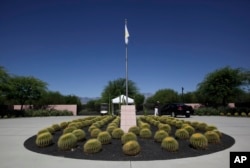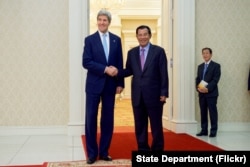The newest U.S. ambassador to Cambodia says he will focus on improving relations and boosting trade between the two countries during his tenure.
In an exclusive interview with VOA Khmer, Ambassador William Heidt said many opportunities now exist for the two countries to build stronger ties.
“I feel very lucky to be here in Cambodia at a time when really there are a lot of interesting possibilities to work together more closely on those issues,” he said. “So I’m excited about making progress on those trade and economic issues. I’ve also noted that the people-to-people relationships between the United States and Cambodia are very strong.”
Heidt worked as an economic officer in the embassy from 1997 to 1999, speaks Khmer and is married to a Cambodian. He said he would also work toward improving Cambodia’s food security and environmental protections.
Improving trade
Heidt will work on establishing a Bilateral Investment Treaty, which would improve trade by encouraging investment, he said.
“We think that would help Cambodia track higher technology investment that will enable Cambodia to manufacture and export sophisticated projects, in what they call global value chains,” he said, adding that these days one product may be produced from input in multiple countries.
Cambodia exported some $2.8 billion in goods to the U.S. in 2014, making it the country’s largest single export market. The U.S. exported about $328 million in goods to Cambodia.
Heidt said Cambodia could also consider joining the Trans-Pacific Partnership, a U.S.-led trade pact that could open U.S. markets further.
“Actually we hope all ASEAN countries come in somewhere down the road,” Heidt said of the TPP. “I think it’s going to be a powerful trade agreement. It’s going to help countries develop their economy, especially Cambodia, which has now become a middle-income country and wants to export more sophisticated product to the world. I think it can be very helpful.”
US-ASEAN relations
Heidt’s interview comes less than a week before Prime Minister Hun Sen and other ASEAN leaders are expected to meet with President Barack Obama for a summit at the Sunnylands estate in Rancho Mirage, California.
On Wednesday, White House Deputy Press Secretary Eric Schultz was asked about reports that the Cambodian prime minister threatened protesters who would demonstrate against Phnom Penh's human rights record at the upcoming summit, which is scheduled to kick off February 16.
“A lot of these countries are in different phases of becoming democratic — with a small 'd,'" Schultz said. "Those are reforms that [Obama] takes very seriously and pursues in private conversations and in public forums ... so I’d expect the right to protest and the right to peacefully be heard falls under that umbrella and do expect the president to talk about the importance of democratic reforms as part of the summit conversations next week.”
The two-day talks will focus on U.S.-ASEAN relations, trade and security. Other meetings around the summit will focus on entrepreneurship and economic growth, Heidt said.
Chum Sounry, a spokesman for the Ministry of Foreign Affairs, said Cambodia is happy to join with ASEAN leaders in the Sunnylands meetings, but what Cambodia would like most is the Bilateral Investment Treaty.
“This is the main goal that we want to increase the economic relations, particularly with the U.S.” he said. “And, we are also considering whether to join the TPP or not.”
Southeast Asia has seen renewed diplomatic interest from the U.S. amid the growing influence of China in the region; however, Heidt said the U.S. is not asking Cambodia to “choose between the U.S. or China.” Rather, it would like to see Cambodia have better economic success.
“I think, as an economist, in the next step for Cambodia’s development, America is going to be very important to it,” he said. “The integration helps Cambodia to move up the value change in manufacturing. That’s why the United States is important too, so Cambodia’s job is to use the relationships effectively with both countries.”
Chum Sounry agreed, saying that Cambodia is looking for greater technology and trade relations with other nations in the world.
“As we have stated, even though Cambodia has good relations with China, Cambodia still needs to build good relations with other countries in the world, including the U.S.,” he said. “The U.S. is the biggest market of Cambodian garment products, so it is very important to strengthen greater economic trade with the U.S...It is our goal and hope.”
Kerry visit
Kung Phoak, head of Cambodia Institute for Strategic Studies, said he sees the possibility for greater trade and ties with the U.S., particularly after the visit of U.S. Secretary of State John Kerry last month. That’s a signal of improved relations from which both countries can build trust, he said.
During his visit, Kerry said the U.S. wants Cambodia to improve its human rights record, governance and democratic development. Heidt said those remain priorities for his U.S. mission as well. Economic development will help that too, he said, as will the non-governmental groups that operate here.
“We hope for step-by-step improvement in the Cambodian economy,” he said. “Just like the Cambodian economy. As the Cambodian economy develops, we hope that its democracy develops too. And so to me, Cambodia needs to just keep making progress on democracy and human rights issues. I think some of the civil society groups in Cambodia are really very good for the country.”
This report was produced in collaboration with VOA's Khmer Service.






